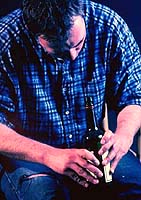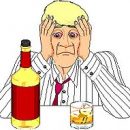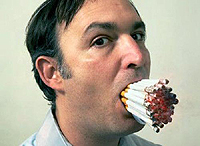Alcoholism can not be called a bad habit. The habit is controlled by consciousness, you can get rid of it. Addiction to alcohol is not amenable to reasonable arguments.
Content
Alcoholism - severe chronic disease, in most cases difficult. It develops on the basis of regular and long-term alcohol consumption and is characterized by the special pathological condition of the body: uncontrollable imposition to alcohol, change in the degree of its portability and degradation of the individual. For an alcoholic, intoxication seems to be the best mental condition.
Alcoholic directs all energy, means and thoughts on the extraction of alcohol, not believing with the real situation (the presence of money in the family, the need to go to work and T.NS.). After drinking out, he seeks to get drunk to complete intoxication, to unconsciousness. As a rule, alcoholics do not eat, they lose the vomit reflex and therefore any amount of drunk remains in the body.
In this regard, they talk about increased alcohol tolerance. But in fact, this is a pathological condition when the body has lost the ability to combat alcohol intoxication by vomiting and other protection mechanisms.
In the later stages of alcoholism, alcohol tolerance suddenly decreases and at an avid alcoholic even the small doses of wine cause the same effect that large amounts of vodka in the past. For this stage, alcoholism is characterized by a heavy hangover after taking alcohol, poor well-being, irritability, maliciousness. During the so-called zayny, when a person drinks daily, for many days, and even weeks, pathological phenomena are so pronounced that medical care is required to eliminate them.
About 10% of people who consume alcohol become alcoholics. Alcoholism - a disease characterized by mental and physical changes in the body. Alcoholism develops according to such a scheme:
Primary phase: Inxianship, «eclipse». A person constantly thinks about alcohol, it seems to him that he drank not enough, he drinks «OPROP», he develops greed to alcohol. However, he retains the consciousness of his guilt, avoids conversations about his thrust to alcohol.
Critical phase: Loss of control over themselves after the first alcohol throat. The desire to find an excuse for your drunkenness, resistance to all attempts to prevent his desire to drink. The person develops arrogance, aggressiveness. He blames others in his trouble. He begins to drink, his friends are random drinking companions. He can leave with a permanent job, loses interest in everything that is not related to alcohol.
Chronic phase: Daily hangover, disintegration of personality, memory deterioration, thoughts. Man drinks alcohol surrogates, technical fluids, cologne. It develops unfounded fears, white hot, other alcoholic psychosis.
White Half - Most common alcoholic psychosis. It usually arises in the face of a hangover, when the drunkard appears immediate fear, insomnia, trembling of hands, nightmares (chase, attacks and t.NS.), auditory and visual hallucinations in the form of noise, calls, shadow movements. White and white is especially expressed at night. The patient begins bright experiences of a frightening nature. He sees crawling around insects, rats who attack him monsters, gangsters, feels pain from bites, strikes, hears threats...
The patient reacts violently to his hallucinations: defended or runs, fleeing against persecution. The day of hallucinations are somewhat faded, although the patient remains excited, his hands are shaking, he is fussy and can not sit in one place.
Another form of psychosis is alcoholic nonsense. He arises after short-term drunkenness, but unlike white death is not accompanied by hallucinations. Such patients pursue obsessive thoughts. Most often it is delirium suspicion, persecution, jealousy. Drunkets, for example, it seems that a conspiracy is arranged against him. Without seeing the release of the situation, he can finish the life of suicide.

 Losing Mind
Losing Mind








